One of the most important parts of any good roofing course (or construction training course in general) is knowing what the right safety measures are to put in place before you even begin. However unfortunately there are still companies out there that ignore this and eventually pay the penalities - such as this roofing firm that have appeared in court after being filmed breaking the law by the BBC's investigative programme Watchdog.
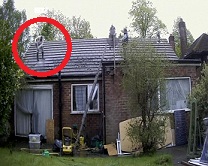 Oldham firm Renov8 (North West) Ltd. and company director Darren Potts were prosecuted by the HSE (Health and Safety Executive) after the show revealed footage of a worker walking around a sloping roof of a property in Droylsden using a pressure washer without any means in place to prevent them slipping and falling the ground below. Mr Potts was filmed watching the work from below. The two men were also seen walking on the roof of another property in Salford, with no scaffolding or other measures in place to prevent injury in the event of a fall.
Oldham firm Renov8 (North West) Ltd. and company director Darren Potts were prosecuted by the HSE (Health and Safety Executive) after the show revealed footage of a worker walking around a sloping roof of a property in Droylsden using a pressure washer without any means in place to prevent them slipping and falling the ground below. Mr Potts was filmed watching the work from below. The two men were also seen walking on the roof of another property in Salford, with no scaffolding or other measures in place to prevent injury in the event of a fall.
Further investigation from the HSE found that Renov8 did not have any employers' liability insurance, which is a legal requirement for all firms. This means that had the employee gotten injured, he would have not been able to claim compensation. The company pleased guilty to two breaches of the Work at Height Regulations 2005 and failing to have employers liability insurance, resulting in a fine of £1000 and £1225 in prosecution costs. Mr Potts himself was sentenced to 200 hours od community service and also had to pay £1225 in costs.
Speaking after the hearing, HSE Inspector Matt Greenly said:
"Renov8 should never have allowed work to be carried out on the roofs of the two bungalows without having suitable safety measures in place. Company director Darren Potts risked not only his own life but the life of an employee by clambering around slippery roofs. Renov8 could easily have hired scaffolding for the work but failed to do this, despite using scaffolding on similar properties in the past. The company also ignored the law relating to employers’ liability insurance, meaning the employee wouldn’t have been able to claim a penny in compensation if he had been injured."
Via HSE
The results are in from the Health & Safety Executive's month-long tour of construction sites and its not looking good.
Over September the HSE visited a total of 2607 construction sites where refurbishment or repair work was taking place, and found that safety standards were not being met on 1105 sites - that's nearly half of the total amount!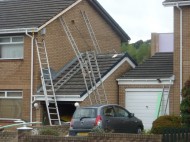
This news doesn't come as a big surprise when you consider the earlier photos the HSE released of some of the sites they visited (which can be seen here and here), but on 644 sites practices were so poor that enforcement action was needed to protect workers. 539 prohibition notices were served ordering "dangerous activities to stop immediately", while a further 414 improvement notices were issued to order a rise in standards. The most common problems identified included failing to protect workers during activities at height, exposure to harmful dust and inadequate welfare facilities.
Heather Bryant, HSE's Chief Inspector of Construction said: "It is disappointing to find a significant number of sites falling below acceptable health and safety standards, where our inspectors encountered poor practice this often went hand in hand with a lack of understanding.
"Through initiatives like this we are able to tackle underlying issues before they become established and we will continue to work with the industry in an effort to drive up standards.
"However those who recklessly endanger the health and lives of their workforce can expect to face tough consequences."
Via Construction Enquirer
Via Construction Enquirer
We mentioned earlier this month that the Health & Safety executive would be taking a tour of building sites across the UK to catch out any that had "less than adequate" facilities. No more than a few weeks later, their inspections have produced some rather shocking results.
So far their tour, which runs from the 2nd September until the 27th, has revealed that nearly half the sites they have visited have some sort of safety failings. Out of a total of 1000 sites, that's a very high number. Many of them had also been issued with enforcement notices.
UCATT (Union of Construction, Allied Trades and Technicians) General Secretary Steve Murphy said: "These figures demonstrate the dangers faced by construction workers on a daily basis.
"While these initiatives by the HSE are very welcome, inspectors are only visiting a small percentage of all the construction sites in the country.
"These findings demonstrate why the HSE needs more resources to conduct this type of inspection in all parts of the country throughout the year."
Below you can see some pictures of some of the sites they visited:
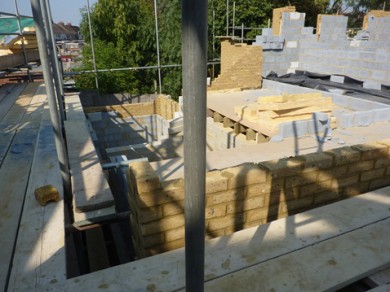
A prohibition noticed was served on this extension work after exposed scaffolding was found, putting workers at risk from falling through on to the building works.
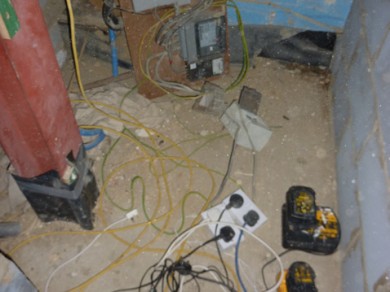
An improvement notice was served here as site management fell below safe standards.
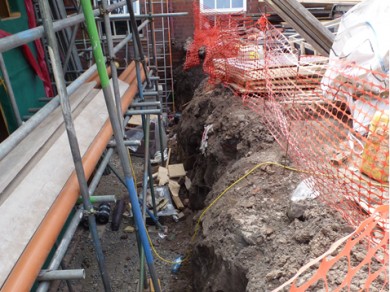
Unsafe excavation work here led to a Prohibition notice.
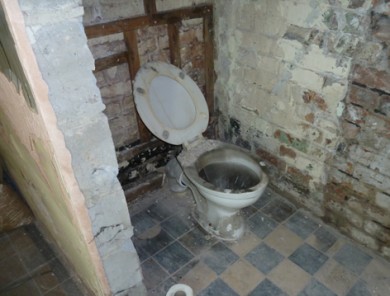
Is this the kind of hygiene facilities you should be finding on a construction site?
----
Are you looking to switch careers and join the construction industry as a carpenter, bricklayer, plasterer, tiler or decorator? Not sure where you can get the qualifications to join this exciting, challenging and rewarding sector? An Access Academies training course could change your life. With the help of our expert teaching staff, you'll work through an intensive construction course that gets you the required qualifications to become a professional tradesman. To find out more, have a look at the courses pages on this website or contact us on 0800 345 7492.